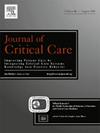Long-term mortality after stage 1 acute kidney injury in critically ill patients - an observational cohort study
IF 3.2
3区 医学
Q2 CRITICAL CARE MEDICINE
引用次数: 0
Abstract
Background
Acute Kidney Injury (AKI) is prevalent in intensive care units (ICU) and is linked with increased mortality. The Kidney Disease: Improving Global Outcomes (KDIGO) guidelines define AKI using serum creatinine and urinary output criteria. While moderate and severe AKI according the creatinine criterion correlate with increased mortality, the significance of stage 1 AKI remains debated.
Methods
Retrospective cohort analysis from two tertiary care centres in Switzerland and Austria (2013−2021) to investigate the association between stage 1 AKI (KDIGO creatinine criterion) in the first seven days after ICU admission and one-year mortality in adult ICU patients. Data were extracted using standardized protocols. Baseline creatinine was determined using estimation formulas. We applied multivariable regression models adjusted for key confounders and conducted sensitivity analyses.
Results
Of 42,446 patients, 4667 (11 %) developed stage 1 AKI, 13 % (n = 5449) moderate/ severe AKI and 32,330 patients no AKI (76 %). Stage 1 AKI associates with one-year mortality (OR 1.6 [95 %CI 1.48; 1.73], p < 0.001) and increases length of stay in ICU (β 1.4 [95 %CI 1.2; 1.5], p < 0.001) and hospital (β 2.7 [95 %CI 2.1; 3.2], p < 0.001). In subgroup-analyses, we observed similar associations in patients with surgery (OR 1.66 [95 %CI 1.45;1.89], p < 0.001) and without surgery (OR 1.61 [95 %CI 1.46;1.78], p < 0.001).
Conclusion
Stage 1 AKI is associated with 1-year mortality in adult ICU patients even in steps below 26.5 μmol/L. This highlights the prognostic significance of subclinical renal injury and underlines the need for increased efforts to diagnose AKI in its full spectrum. The analysis is limited by basing the AKI diagnosis on creatinine criterion.
危重患者1期急性肾损伤后的长期死亡率——一项观察性队列研究
背景:急性肾损伤(AKI)常见于重症监护病房(ICU),并与死亡率增加有关。肾脏疾病:改善全球预后(KDIGO)指南使用血清肌酐和尿量标准定义AKI。虽然根据肌酐标准,中度和重度AKI与死亡率增加相关,但1期AKI的重要性仍存在争议。方法回顾性队列分析来自瑞士和奥地利两家三级医疗中心(2013 - 2021)的数据,研究ICU入院后7天1期AKI (KDIGO肌酐标准)与成人ICU患者一年内死亡率之间的关系。采用标准化方案提取数据。基线肌酐采用估算公式测定。我们采用调整了关键混杂因素的多变量回归模型并进行了敏感性分析。42,446例患者中,4667例(11%)发展为1期AKI, 13% (n = 5449)为中/重度AKI, 32,330例患者无AKI(76%)。1期AKI与1年死亡率相关(OR 1.6 [95% CI 1.48;1.73], p &;0.001)并增加ICU住院时间(β 1.4 [95% CI 1.2;1.5], p <;0.001)和医院(β 2.7 [95% CI 2.1;3.2], p <;0.001)。在亚组分析中,我们观察到手术患者有类似的关联(OR 1.66 [95% CI 1.45;1.89], p <;0.001)和未手术(OR 1.61 [95% CI 1.46;1.78], p <;0.001)。结论1期AKI与成人ICU患者1年死亡率相关,即使步长低于26.5 μmol/L。这突出了亚临床肾损伤的预后意义,并强调需要加大对AKI全谱诊断的努力。基于肌酐标准诊断AKI的分析受到限制。
本文章由计算机程序翻译,如有差异,请以英文原文为准。
求助全文
约1分钟内获得全文
求助全文
来源期刊

Journal of critical care
医学-危重病医学
CiteScore
8.60
自引率
2.70%
发文量
237
审稿时长
23 days
期刊介绍:
The Journal of Critical Care, the official publication of the World Federation of Societies of Intensive and Critical Care Medicine (WFSICCM), is a leading international, peer-reviewed journal providing original research, review articles, tutorials, and invited articles for physicians and allied health professionals involved in treating the critically ill. The Journal aims to improve patient care by furthering understanding of health systems research and its integration into clinical practice.
The Journal will include articles which discuss:
All aspects of health services research in critical care
System based practice in anesthesiology, perioperative and critical care medicine
The interface between anesthesiology, critical care medicine and pain
Integrating intraoperative management in preparation for postoperative critical care management and recovery
Optimizing patient management, i.e., exploring the interface between evidence-based principles or clinical insight into management and care of complex patients
The team approach in the OR and ICU
System-based research
Medical ethics
Technology in medicine
Seminars discussing current, state of the art, and sometimes controversial topics in anesthesiology, critical care medicine, and professional education
Residency Education.
 求助内容:
求助内容: 应助结果提醒方式:
应助结果提醒方式:


